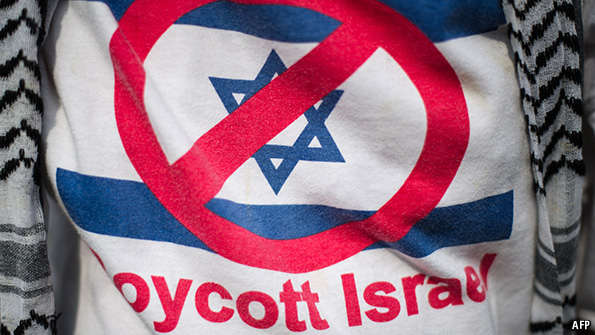DEBATES over Israeli policy, and particularly over the country’s treatment of Palestinians, have long been fixtures on college campuses. But it seems these intellectual tussles are growing both more frequent and more fraught, according to a recent article in the New York Times. Jennifer Medina and Tamar Lewin write that it is not uncommon for discussions now to “stretch from dusk to dawn, punctuated by tearful speeches and forceful shouting matches, with accusations of racism, colonialism and anti-Semitism.” At the centre of these disputes are calls by campus activists for colleges to boycott Israeli businesses, owing to what they characterise as Israel’s unjust treatment of Palestinians.
The petitions are part of a broader campaign for boycotts, divestments and sanctions (BDS) against Israel in protest against what critics call “Israeli Apartheid”. The decade-old movement calls on Israel to withdraw from the territories acquired after the 1967 six-day war; to dismantle the wall that separates pre-1967 Israel from parts of the West Bank; to permit Palestinian refugees to return to their homes; and to grant Arab-Israeli citizens “full equality”. As we wrote last year, the campaign is no longer the preserve of crackpots. Rather, it has had some success entering the mainstream. Some European pension funds, such as PGGM, have withdrawn investments. Some large corporations have cancelled contracts.
And student-government councils are increasingly embracing BDS resolutions at “dozens of college campuses across the country,” according to the New York Times. These students join peers on campuses in Canada and Europe, such as Britain, France. This has not resulted in any official changes in college policy, but the debates on campuses rage on, and they rage in circles. Critics of Israeli policy argue that the country denies basic human rights to millions of Palestinians on the West Bank and in Gaza, and sustains its occupation of Arab land with indiscriminate force. Israel’s defenders say that the Palestinians are at least partially to blame for the impasse in the peace process, and they add that the BDS campaign singles out the world’s lone Jewish state for criticism when plenty of other countries, including many of Israel’s Arab neighbours, mete out more flagrant injustices. This selectivity, say BDS critics, smacks of anti-Semitism.
Both sides are clinging to specious arguments. Claims that the BDS campaign is somehow misguided because its proponents are not troubled enough over the denial of the vote to 1.3 billion Chinese people or the sad state of women’s rights in Saudi Arabia are doubtful. There is no duty to fight all injustice in order to fight some. And it’s no defence of Israel to say that policies are just as bad or worse elsewhere. BDS supporters are right when they say that criticism of Israel can be delivered without anti-Semitic intent. If the two are really of a piece, then Ha’aretz, the Israeli daily preferred by Israel’s leftist intelligentsia, is a hotbed of Jew hatred.
That said, calls for boycotts on some campuses have been tainted by clear expressions of anti-Jewish sentiment. At the University of California, Davis earlier this year, a successful boycott vote was followed by Muslims taunting Jewish students with chants of “allahu-akbar” and painting swastikas on a Jewish fraternity. At UCLA a Jewish student almost lost a seat on the student judicial board over concerns among fellow students that she was perhaps too “active in the Jewish community” to “maintain an unbiased view.”
The BDS campaign also seems to prefer straw men to realistic positions. Take the demand that Israel retreat to its 1967 borders, before it seized the Sinai, the West Bank and the Golan Heights in a defensive six-day war. BDS fails to address the complexities of such a move. Hundreds of thousands of Israelis now live beyond this border. Some of these settlers will have to go, but it would be unreasonable to shove everyone out of homes they have lived in for decades. Advocates of a two-state solution have taken account of this complication with proposals to swap out some land in pre-1967 Israel for equal portions of land on the West Bank. But reasoned compromise is not part of the BDS discourse.
The same goes for the campaign’s demand that Israel submit to an unconditional right of return for descendants of Palestinians who fled or were expelled from their homes in the wake of the war of independence in 1948. Supporters must know that an influx of 5m Palestinians into pre-1967 Israel would put an end to any possibility of Israel continuing to be a Jewish and democratic state. This is the so-called one-state solution, a resolution to the Israeli-Palestinian impasse that is born of fantasy, not of pragmatism.
This is not to say that the BDS campaign is necessarily anti-Semitic. Opponents of the boycott need to make a better case than that. But to sanction Israeli companies and universities until Israel agrees to implode is not quite kosher, either. The boycott movement springs from a noble motive of advocating for a long-suffering underdog. But the positions BDS pushes are non-starters for Middle East peace negotiations. They can only inspire resentment and retrenchment, not constructive dialogue, among students on college campuses.





